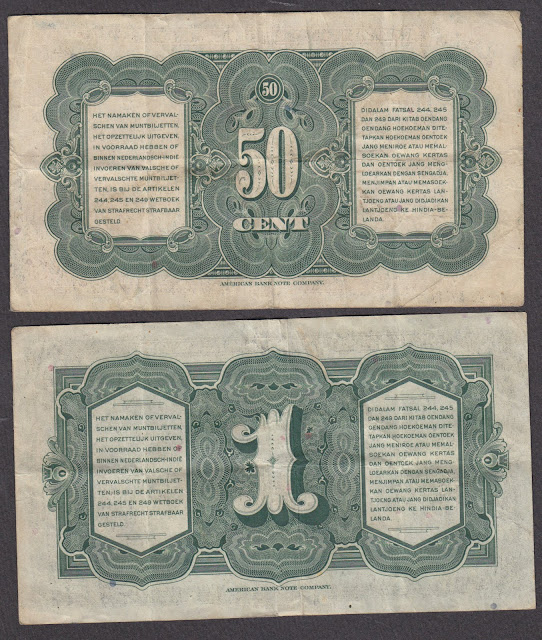Illustrated below is a stamp set issued in the early 1960's when Burundi first became independent. Formerly part of the Belgian Colony of Ruanda-Urundi. The first Burundian stamps used the stamps of Ruanda-Urundi with the overprint Royaume de Burundi. Thereafter they produced their own stamps. The country became a republic in the 1970's. The details are of the 1 Franc and 20 Franc values.
Tuesday, September 13, 2011
Monday, September 12, 2011
Great Britain-The Clydesdale Bank 1 Pound Banknote-1967-Illustrated
Illustrated below is an example of the 1 Pound note issued by the Clydesdale bank of Scotland. Founded in Glasgow in 1838 the bank is one of three Scottish banks with the right to issue banknotes. Now however it has become a subsiduary of a large multi-national bank. The Clydesdale bank ceased issuing 1 pound notes in 1980 some commemorative notes of higher values are still issued in its name.
China-The 5000 Custom Gold Unit Note-1947-Illustrated
(See details of the history of the "Custom Gold Unit 500" blog post). Illustrated are the obverse and reverse of the 5000 Custom Gold Unit. The second issue of CGU's were printed by many different banknote printing companies in China and overseas. This example was printed by the Chung Hwa Book Company.
China-500 Customs Gold Unit-Note-Illustrated
Illustrated below is the obverse and reverse of the Custom Gold Unit note. The notes were not originally an issue of banknotes but were used to pay customs duties at Chinese ports. This 500 CGU note was issued in 1947 during a period of inflation. Values went very high as inflation progressed starting at 500 and progressing to 250,000. Originally issued in 1930 in values of 0.10, 0.20,1, 5,10, 20,50,100, and printed by the American Bank Note Company Custom Gold Units were issued as currency in 1942 and thereafter printed by a variety of British, American and Chinese note printers. This example was printed by the Security Banknote Company. The obverse bears a portrait of Sun Yat Sen the Chinese Nationalist leader and the reverse an illustration of the Shanghai Customs House.
Two Designs of the British 10 Shilling Banknote-Illustrated
Illustrated below are the obverse and reverse of the British 10 Shilling banknote. The first 10 Shilling note was introduced in November of 1928 and the upper illustration is the same design. The 10 Shilling note was not dated and year of issue is determined by the signature of the Chief Cashier in these examples L.K. O'Brien. The design of the first example was discontinued in October of 1961 and thereafter the a new design was introduced bearing a portrait of Queen Elizabeth the 2nd. This design continued until the note was withdrawn in November 1970 after the introduction of decimalization and the 50 Pence coin.
Two Banknotes of the Dutch East Indies-Issued During World War 2-Illustrated
Illustrated below are the obverse and reverse of two banknotes with values of a Half Gulden and 1 Gulden. The notes were printed in America in 1942 and dated 1943 by the American Bank Note Company (see detail). Although the Japanese had by 1942 occupied the Dutch East Indies (now Indonesia) the notes were printed on the orders of the Dutch Government in Exile for their return to Indonesia. The notes were known as NICA Gulden (Netherland Indies Civil Adminstration Gulden). The notes bear a portrait of Queen Wilhelma the 2nd the reigning monarch of Holland.
NAWANAGAR-1893 Postage Stamp Issue-Old Indian Princely State Stamps-Illustrated
Issued in 1893 during the reign of Jam Vibhaji (1882-1895) and in values of Docras. The set consists of a 1 Docra (black), 2 Docra (deep-green), and 3 Docra (orange-yellow/with orange shades). The stamps were issued without gum and are more highly valued in a very fine used state. Intaglio seals were used in postal cancellations (three examples are shown here). Nawanagar stamps become obsolete in 1895.
SIRMOOR-Indian Princely States-The 1892 Stamp Reprints of the First Issue-Illustrated
Illustrated below are the reprints of the original stamp issue of 1878. MAde about 1891 the reprints were issued in 1892 to supply stamp collectors but little interest was shown at the time and the stamps were used postally within Sirmoor. The reprint had the same colour and value as the originals (a 1 Pice deep-green also exists as a reprint) but can be identified by the outside edge that mimics stamp perforations, the printers copying the designs from a stamp dealers catalogue. The two details below compare the original and the reprint.
SIRMOOR-1878-The First Postage Stamps-Indian Princely States-Illustrated
Illustrated below are the first postage stamps issued in Sirmoor during the rule of Raja Shamsher Parkesh (1886-1898) they were issued between 1878 and 1880. Their values were 1 Pice (pale-green) issued in 1878 and 1 Pice (blue) in 1880. They are more highly valued in a very fine postally used state than mint.
2 and a Quarter Anna Postage Stamp Issues-Cohin Maharaja Stamps-Illustrated
Below are some of the 2 Annas and a Quarter (yellow-green) issued by the Cochin Maharajas. Examples shown are of Sri Rama Varma the 3rd, Kerala Varma the 2nd and Ravi Varma. The detail shows the striking difference between the recees printing in London by Perkins Bacon and the litho printings of Associated Printers of Madras. The clarity and colour of the recess printed stamp is very obvious.
Sunday, September 11, 2011
Early Indian Stamps-The 1 Anna 8 Pies Issue of Sri Rama Varma the 3rd-Illustrated
Below are some of the varieties of the 1 Anna 8 Pies issue of Sri Rama Varma the 3rd, Maharaja of Cochin 1932-1941. The stamps were issued between 1933 and 1938. Many of the stamps were overprinted for official use and/or surcharged also, with others with altered overprint values. Four of the varieties are shown.
Friday, September 9, 2011
Subscribe to:
Posts (Atom)






































